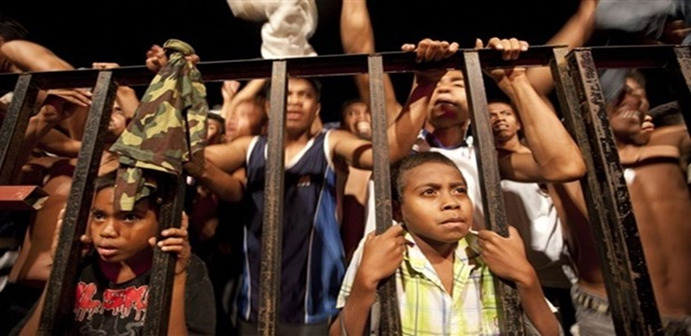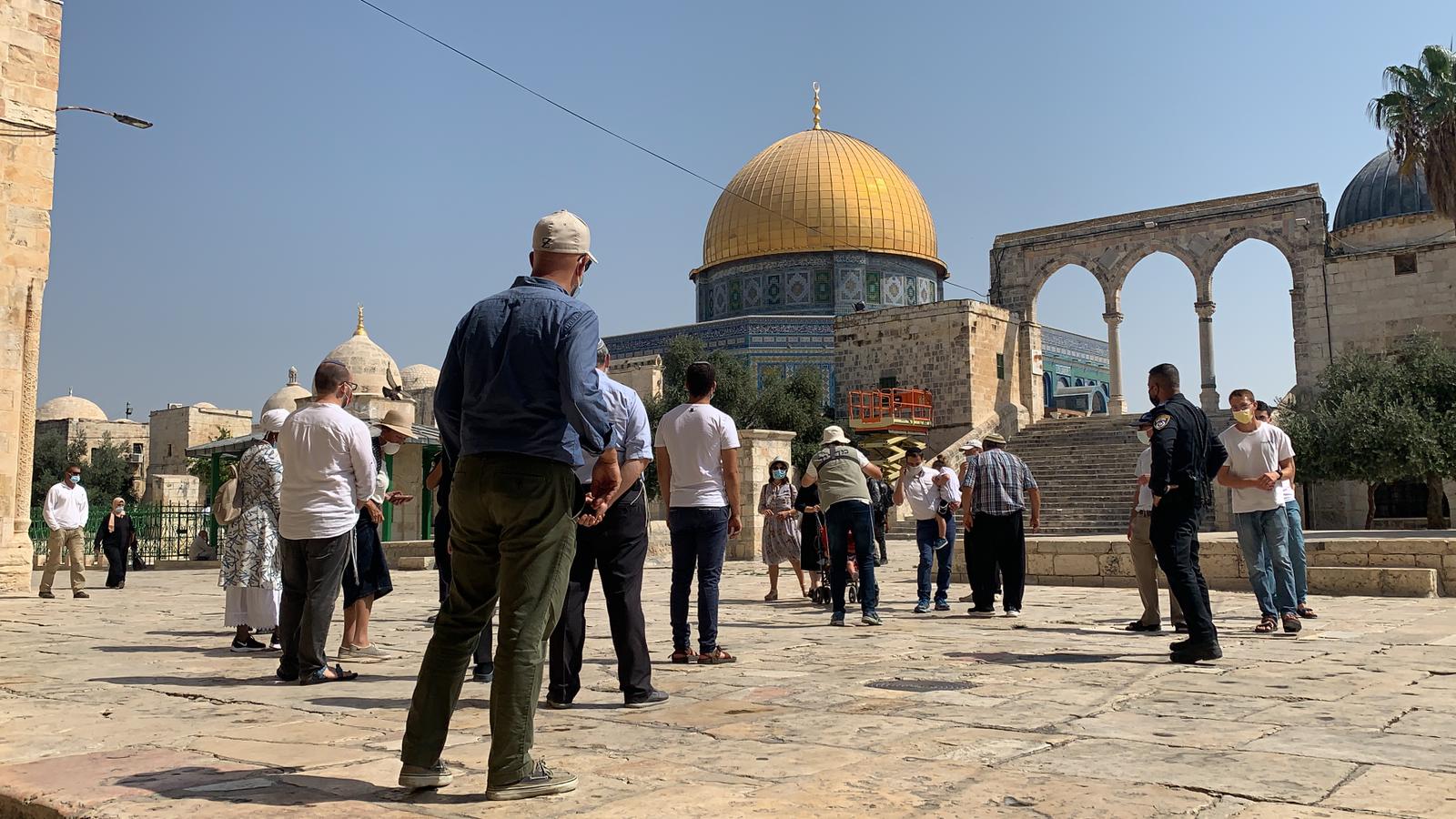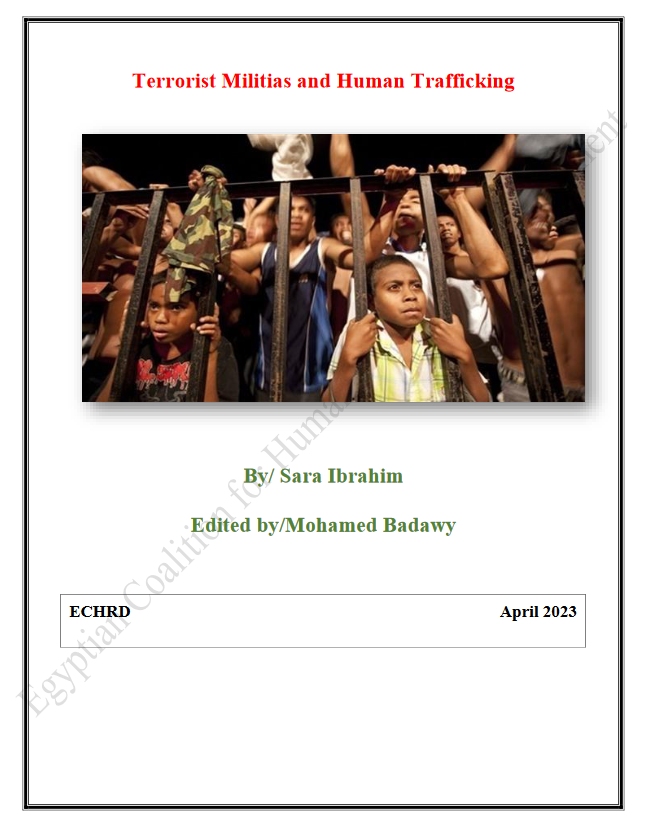Press Release
…………………………………………………
The Egyptian Coalition for Human Rights and Development (ECHRD) issues its report on terrorist militias and human trafficking, which deals with the role of terrorist militias in the growth and spread of human trafficking, through several points, such as:
What is the crime of human trafficking – Forms of human trafficking – Negative effects of human trafficking – Terrorist militias and human trafficking – International efforts to combat human trafficking – Recommendations
Human trafficking is third in terms of profit, in the list of global organized crimes, after drugs and arms trade. It achieves billions of dollars as a profit. It can be considered as one of the most important sources of financing of the activities of transnational organized crime gangs, especially terrorism and money laundering. This type of crime has a special nature because its main commodity is human beings who are led by economic, social and political conditions and security instability in their countries due to conflicts and wars to fall into the clutches of these gangs through financial temptations and false promises of a better life. The main victims of human trafficking are women and children. According to the first report of the OSCE special representative on human trafficking, ten years after the ministerial decision to combat sex trafficking, exploitation is the most common form of human trafficking in Western Europe.
Militias and terrorist groups have played a major role in the growth and spread of the crime of human trafficking, as an army that is usually formed by irregular forces of citizens and usually operates guerrilla style, unlike the fighters of regular armies and professional soldiers. They take advantage of the collapsing political and economic conditions in countries and the citizens’ need for funds, in order to provide sources of financing their activities and to purchase weapons.
The report pointed out that it was not out of the question that terrorist militias are trafficking human beings, in order to obtain the necessary funds to finance their activities and purchase the necessary weapons and equipment, which led to the emergence of what is known as “Jihad al-Nikah”. The record of terrorist organizations is full of the ugliest practices of human trafficking. The practices of ISIS and other terrorist organizations have set mankind back centuries. They brought back the use terms and labels for behaviors that are supposed to be extinct and no longer exist in the dictionary of human relations.
The Lebanese Hezbollah militia and the Fourth Division are parts of the largest human trafficking networks. They are taking advantage of their grip, extending from Iraq to the Sea of Lebanon, from which death boats depart to Cyprus, Greece and Sicily, in addition to transporting citizens from various Syrian regions to Lebanon and back for money.
Armed terrorist factions, which are loyal to Turkey in northern Syria, also use kidnapping to gain profit and funding after demanding ransom from the families of the kidnapped, which amounts to $ 40,000 per hostage.
The Houthi terrorist militias bear direct responsibility for the deterioration of health conditions, due to the crimes committed by this Iranian-backed terrorist faction. The latest Houthi crime is the seizure of a number of hospitals and turning them into secret slaughterhouses and headquarters for human trafficking gangs.
The Houthi militias also kidnapped children and stole their organs such as the liver or kidney, returning the children weeks later in a deplorable state, assaulted or killed.
Most of the victims of crimes committed by the Houthi militias are among the poorest groups or those who are suspected of disloyalty to the militias.
The term jihad al-nikah is also popular in places under control of ISIS, especially in Syria and Iraq, where the weapon of sex and women is widely used to attract fighters to join them.
It was revealed that some women receive sums ranging from $300 to $500 per month in exchange for serving men and practicing jihad al-nikah with ISIS members to spend that money on their children or themselves. The age of women who procreate and take care of household affairs ranges between nineteen and seventeen years most of the time.
After 2014, ISIS recruited about 4,000 women. Their first task was to unload the sexual repression of men, giving that jihad is the end goal and men must be psychologically prepared for this jihad. The organization issued many fatwas on the discharge of the sexual desires of men as a result of their preoccupation with wars most of the time.
Finally, the report issued recommending the following:
- Setting comprehensive Arab strategy to combat human trafficking and the mechanisms to put it into action including legislation, regulation and international cooperation aspects.
- Paying more attention to victims of human trafficking crimes through the efforts of all categories of the society.
- Urging human rights and legal institutions to play their responsible role in detecting international crimes related to the trade of human organs, which is the first target of human trafficking
- Urging local, regional and international media institutions to play their humanitarian role in exposing human trafficking crimes as an aid in confronting this crime that affect humanity.
- Working on coordinating the efforts of global, regional and local human rights institutions in confronting crime, through holding specialized conferences to discuss this issue.
- Supporting criminal justice institutions in law enforcement and victim protection.
- Encouraging international cooperation between all countries to eliminate the crime of human trafficking, especially as this crime has taken international and transnational forms. This necessitates international cooperation, especially between the country of origin, country of transit and the country of destination, with the need to emphasize the adoption of an international action toward countries that do not comply with international conventions in the field of combating human trafficking.
- The Anti-Human Trafficking Law should explicitly stipulate that the victim shall not be punished for acts that may have been forced to do, which can constitute a violation of the laws.








